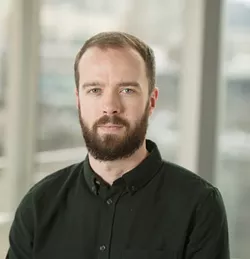In the aftermath of the worst mass shooting in United States history, gay men — some even survivors of those horrific hours at the Pulse nightclub in Orlando, Florida — wanted to donate blood but were not allowed to help, blocked by a ban from the U.S. Food and Drug Administration. The salt in the wound didn't make sense — that it was legal to buy the Sig Sauer MCX assault rifle that was used to commit the massacre, but illegal for a gay man to donate blood to victims of that massacre.
Although the FDA lifted the stricter Reagan-era lifetime ban, the current discriminatory policy bans blood donations by healthy gay and bisexual men (officially, men who have sex with men or "MSM") for 12 months after their most recent sexual contact.
"Most people don't even know the year of celibacy rule exists," says Kyle Richardson, Prevention Program Manager at the Spokane AIDS Network. "They are shocked when they find out."
One encounter can prohibit both men from donating blood for a full year, and only if they have no other same-sex encounters during that year, even if they test negative for HIV in the interim. Giving blood is based in the recognition we all want to help, but the FDA screening is based on orientation, not science. The gender of one's partner has nothing to do with whether one is engaged in "risky" behavior or not.
The frustration hit home when a dear friend of mine wanted to donate but couldn't. He would have to stay silent — to lie, which, of course, he didn't do. "I feel like I've been forced to lie too many times," he told me. His protected sexual experience with his partner disqualified him from saving a life.
The one-year celibacy requirement continues to ignore that all blood donations are thoroughly tested using the latest technological advancements, with more than 4.2 million eligible blood donors affected by the requirement. Lifting the ban on MSM donors could help save the lives of more than a million people.
It also fails to take into account whether the would-be donor used a condom or was on Pre-exposure prophylaxis (PrEP), or had otherwise reduced the odds of HIV transmission — even if he repeatedly tests negative for HIV.
In other words, the FDA is saying there's no such thing as safe sex between two men. All sex between men is shamed, a tactic also used by opponents of equality. Meanwhile, the consequences of stigma and discrimination can foster a reluctance to seek care; deter individuals from getting tested; discourage HIV positive persons from discussing their status with sexual partners; and have a negative effect on the overall success of treatment.
We know the proper approach to preventing the spread of HIV is to increase access to high-quality preventive care and early treatment — not penalizing individuals based on their orientation.
Globally, new HIV infections have fallen by roughly 40 percent since 2000, and we must continue to focus on our efforts to create an AIDS-free generation by supporting sexual and reproductive health care in our communities, no matter the location, race, age, or gender.
Lifting the ban was a first step, but it's not enough, and there are still blood banks in Washington that have upheld the old ban.
Fortunately, Sens. Maria Cantwell and Patty Murray joined a bipartisan group of 24 senators calling for the FDA to swiftly move to end the discriminatory restriction.
It worked. The FDA posted a request for public comment on the federal register through Nov. 25 of this year for what alternative blood donor policies could look like, signaling the possibility that the restrictions might be lifted.
This step in the right direction reminds the world that the "H" in HIV stands for human, not homosexual. Richardson, from the Spokane AIDS Network, put it best: "HIV does not discriminate."
Building a movement starts with showing up for our partners and our people, so please: Comment. Take a little time out of your day and call or email your elected officials with a clear message to end this outdated policy. Not doing so — staying silent— isn't enough anymore. I want my friend to be able to save a life without thinking about whether he has to lie — to first question his status as a human. ♦

















